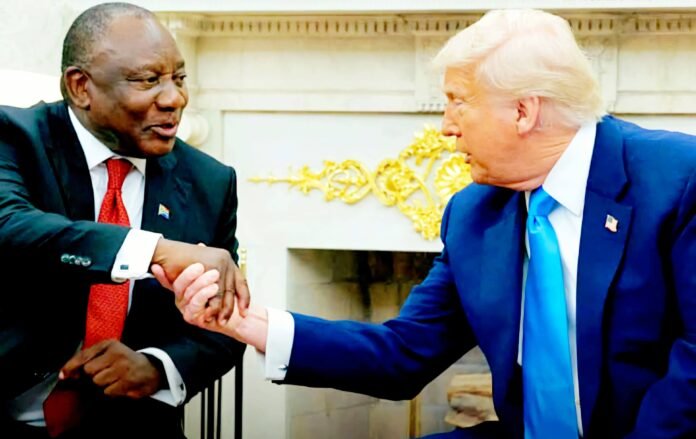Trump’s 30% tariff shock: The facts, fallout, and the diplomatic tug-of-war
In a move that’s rattled markets and stirred diplomatic unease, US President Donald Trump has imposed a 30% blanket tariff on all South African goods entering the US—effective August 1, 2025. The decision, publicly delivered via a letter posted to Trump’s Truth Social, accuses South Africa of maintaining an “unreciprocal” trade relationship and calls for sweeping reforms.
“We have had years to discuss our Trading Relationship… [but] must move away from these longterm, and very persistent, Trade Deficits,” Trump wrote.
The policy shift has already rocked markets—the South African rand fell 1% in the hours following the announcement—and set off a chain reaction of political and economic responses from Pretoria.
The fine print: What Trump’s letter actually demands
Along with the 30% tariff, Trump outlined multiple conditions that deepen the impact:
- Retaliation Will Be Punished: Any increase in South Africa’s tariffs will be met with additional hikes.
- Exemptions for US-Based Production: South African firms can dodge tariffs by relocating manufacturing to the US.
- “Anti-American” BRICS Clause: Trump has warned of a 10% penalty on BRICS-aligned nations, with no exceptions.
- Open Door, with Conditions: Tariffs may be revised “upward or downward” depending on future negotiations.
“These Tariffs may be modified, upward or downward, depending on our relationship with your Country. You will never be disappointed with The United States of America.”
Ramaphosa fires back: “This is not what the data shows”
South Africa’s presidency has firmly rejected the basis of Trump’s decision. In a statement from spokesperson Vincent Magwenya, the government accused the US of using “a contested interpretation” of the trade data:
“In our interpretation… 77% of US goods enter the South African market under the 0% duty.”
Magwenya emphasized Pretoria’s willingness to negotiate, highlighting a Framework Deal submitted to Washington on May 20—just ahead of Ramaphosa’s high-profile White House visit.
“South Africa has continued to engage the United States… President Ramaphosa has instructed the team to urgently engage with the US on the basis of the Framework Deal.”
Global ripples: Sanctions, expulsions, and the BRICS factor
This move isn’t occurring in a vacuum. It follows months of rising tension between the two nations, including:
- US expulsion of SA’s Ambassador Ebrahim Rasool
- Sanctions over land expropriation and SA’s ICJ case against Israel
- A chilling Trump warning in 2024 on BRICS-aligned states
The timing is no coincidence. Just days ago, BRICS leaders met in Rio de Janeiro, issuing a statement condemning “unilateral tariff measures” by major economies—widely interpreted as a swipe at Washington.
The diplomatic clock is ticking
The original 90-day pause on tariffs (granted in April) was due to expire on July 9, but the Trump administration has now extended the grace period to August 1—a date Trump has since said is “not 100% firm.” While some interpreted this as wiggle room, others see it as a tactical feint.
According to Trade Minister Parks Tau, discussions may yet resume:
“There is still room for engagement on the matter.”
But Pretoria has yet to receive a promised US trade template, even after engaging with US officials during the US-Africa Summit in Luanda.
Economic fallout and resilience planning
As the rand weakens and investor confidence dips, the Ramaphosa administration is urging a pivot to trade diversification.
“Government trade negotiations teams and South African companies must accelerate their diversification efforts,” said Magwenya.
This echoes calls for new bilateral trade routes, including strengthening links with Asia, Europe, and Africa.
High stakes, high pressure
Trump’s tariff salvo is more than a policy dispute—it’s a moment of reckoning. For South Africa, it means navigating a precarious diplomatic storm, rethinking trade routes, and confronting the long-term implications of aligning with BRICS.
And for the world? It’s a stark reminder that under Trump’s “America First” doctrine, tariffs are not just tools—they’re weapons.
📰 For real-time updates on Stories Shaping South Africa Today, stay with NOWinSA.

